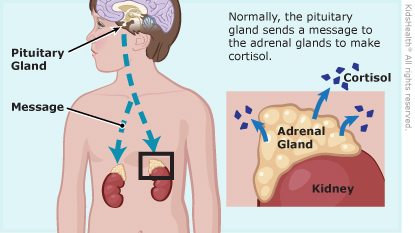Adrenal Insufficiency: How to Care for Your Child
The adrenal glands (located above the kidneys) make hormones like cortisol that help the body handle stress and control blood pressure. Adrenal insufficiency means that these glands don't work properly.
There are two types of permanent adrenal insufficiency:
-
Primary adrenal insufficiency: This is when the adrenal glands don't make cortisol. Sometimes they don't make another hormone called aldosterone, which controls salt balance in the body.
-
Central adrenal insufficiency: This is when the pituitary, a small gland beneath the brain, doesn't make enough adrenocorticotropic hormone (ACTH),which triggers cortisol production. This is caused by diseases or problems with the brain or pituitary gland.
Sometimes, problems caused by adrenal insufficiency can suddenly become much worse. This is called an adrenal crisis and needs emergency care.
Your child will need to take medicine to replace the hormones the body isn't making enough of. When parents know how to prevent and treat problems, most kids with adrenal insufficiency can live normal, healthy lives.


-
Talk with your health care provider about when to give your child medicine. Find out if there are times when you should increase the dose.
-
If your child has problems with low blood sugar, keep blood sugar testing equipment and glucose gel in your home as directed.
-
Follow the instructions on what to do if your child has a fever, diarrhea, vomiting, other signs of being sick, or cannot take or hold down medicines.
-
Know what to do in case of an adrenal crisis. Share this information with your child's school nurse and any other caregivers.
-
Make sure you feel comfortable giving your child injectable hydrocortisone (cortisol) to prevent or treat an adrenal crisis. Carry it with you at all times.
-
Make sure your child always wears a medical bracelet or other ID that explains the condition and what to do in an emergency.
-
If your child needs surgery, tell the surgical team that he or she has adrenal insufficiency. Anesthesia and surgical procedures are stressful to the body, so your child's medicines might need to be adjusted.

Your child:
-
appears dehydrated; signs include dizziness, drowsiness, a dry or sticky mouth, sunken eyes, crying with few or no tears, or peeing less often (or having fewer wet diapers)
-
is vomiting (throwing up) repeatedly
-
becomes very weak or confused, or passes out

What are the symptoms of adrenal insufficiency? A child with adrenal insufficiency may:
-
be more tired than usual
-
feel sick, have belly pain, or throw up
-
have low blood pressure and low blood sugar
-
have darker skin than normal
Some children don't show signs of adrenal insufficiency until they're under stress.
Are there other types of adrenal insufficiency? Yes, there is another type of adrenal insufficiency. It can happen to some kids who take high doses of cortisol-like medicines (like prednisone). If health care providers lower the dose or stop the medicine, it may take weeks or months before the child's adrenal glands can make enough cortisol on their own again.
What happens when a child has adrenal crisis? Adrenal crisis can happen when a child with adrenal insufficiency is stressed by an illness or injury. Health care providers treat an adrenal crisis in the hospital or emergency department by giving kids IV (into a vein) hormones and fluids.